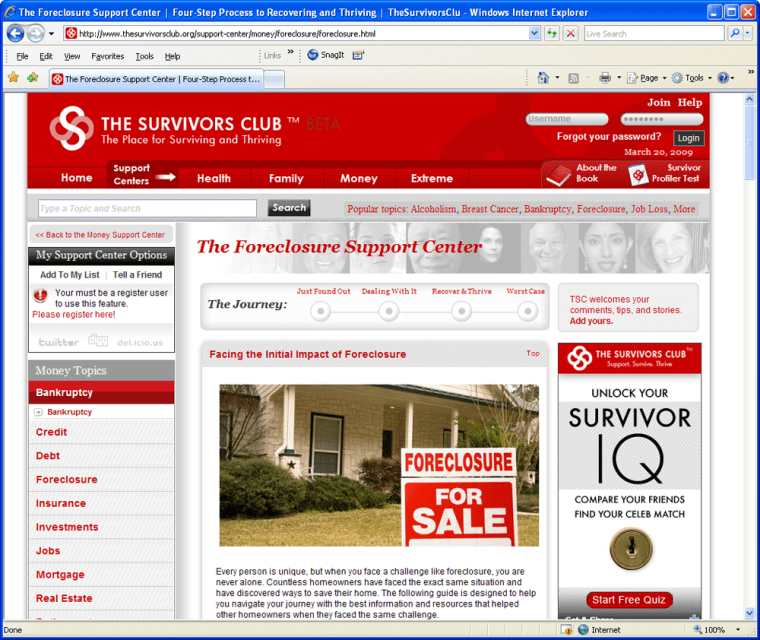Searching for more than advice to navigate the foreclosure process, delinquent homeowners are seeking solace in online support groups.
Sites like DailyStrength.org, and the recently launched TheSurvivorsClub.org, for example, offer resources, tools and connect users with others who are going through foreclosure. The portals cater to homeowners looking for more than advice about the financial complexities of losing a home.
"Mostly, people who are struggling with their lenders are looking for support, looking for people who have been through the same process, a shoulder to cry on," says Lars Nilsen, a vice president at Atlanta-based How Stuff Works International Inc., which operates DailyStrength.org.
The DailyStrength.org added the "Mortgages and Foreclosures" support group in October 2007 to provide "free, anonymous support from people just like you."
Like Facebook and similar social networking sites, users can create a personal profile, amass friends, and upload photos and video. The site includes a "Hugbook" feature, where if someone is at a loss for what to say in the way of support, they can send a smiley face, heart or rainbow icon.
Users can post discussion threads and chat with people in real time, although, only a handful of members in the group were signed on during on recent afternoon.
Here, often under the veil of an alias, users unabashedly swap housing horror stories and tales of families torn apart.
In one post from October, a single mother of two explains she is struggling through divorce and trying to get her home refinanced. She reveals she's three months behind on her loan, adding "My stomach is always upset and I could just cry continuously."
Another poster encapsulated her frustration over losing her home with a more primal expression: "AAAAGGHHHHHH!!!"
The value of communal support is partly why Ben Sherwood launched TheSurvivorsClub.org in January. His goal was to bring together people who have lived through everything from cancer to dire financial straits.
"Everybody is struggling with something or knows someone who is," says Sherwood, author of "The Survivors Club: The Secrets and Science that Could Save Your Life. "The concept of The Survivors Club is that there is strength in numbers ... they know some of the secrets and the shortcuts."
Sherwood says hundreds of thousands of people have visited the site, but declined to say how many registered members it has.
On the site's "Foreclosure Support Center," visitors can find information about navigating the foreclosure process and advice. Users can also find links to government housing sites and other portals with foreclosure information.
Like other social networking sites, The Survivors Club lets users register anonymously and form networks of friends with others. In coming months, Sherwood plans to roll out additional social networking features, including discussion forums.
While helpful avenues for many, online foreclosure forums can be fertile ground for lawyers and shady loan modification outfits looking to score some business.
Even when spammers are kept at bay, one can find Google text ads on the margins of the page, as on DailyStrength.org's site, plugging ways to just "walk away" from one's home.
On DailyStrength.org, Nilsen says moderators go through the forums and ensure they're not becoming targets for spammers plying foreclosure-avoidance services.
In some cases, real estate professionals do enter the forums and offer advice, something Nilsen says the site encourages as long as they don't cross the line and start peddling their services.
Sherwood says his site doesn't allow users to become members if they're doing it to conduct business.
Mike Bertrand of Newbury Park, Calif., who organizes a foreclosure support group at a church, says he's come across online forums full of spam advertising loan modification and other services to distressed homeowners.
"They don't need to pay someone $3,000 to do it for them," says Bertrand, who launched his own online foreclosure forum — WeAreMovingForward.org — a few months before he lost his home to foreclosure last year.
Still, only a handful of people have been shown up to the meetings, and fewer have posted on the Web site.
"It's good for some people, but not everyone is comfortable going to a computer for a support group," Bertrand says. "Other people love it and don't mind sharing to the whole wide world and spilling their guts out."
